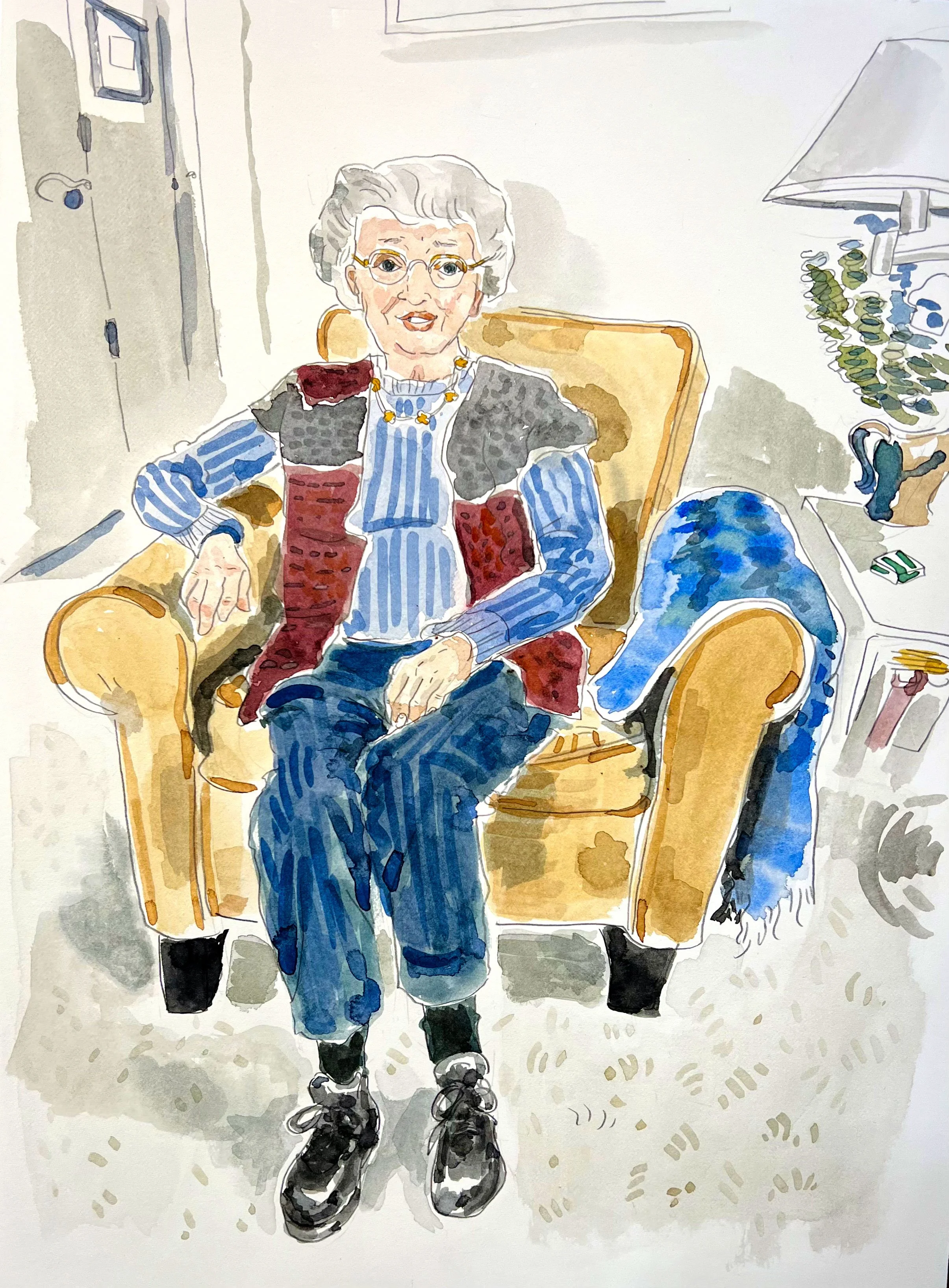Cambridge Seniors: Ilse Heyman
Hear Ilse Heyman’s voice here.
Waiting in the lobby of the stately elderly care facility where Ilse Heyman lives, I read up on her again to prepare my questions. I knew two things: that she was approaching her 100th birthday, and that she is a survivor of the Holocaust. I’d read that the Dutch electronics company, Philips, had somehow been instrumental in saving Jewish people, including Ilse herself, during the Holocaust. Why had I heard of Oskar Schindler and not the Philips story?, I wondered.
As I was waiting for the appointed time to arrive, a petite woman who looked to be about seventy years old, if that, approached me.
“Are you Susan?” Her English retains the slightest trace of a German accent.
“Yes! You must be Ilse?”
“Yes. Shall we go up?” she said amiably, and took off at a brisk pace for her apartment.
As I followed her, a memory suddenly returned to me: when I was a teenager, my work had placed in an art and poetry contest that sought work about the Holocaust. At the prize ceremony, I’d met a number of survivors, many of them in their eighties. I never imagined I’d be meeting any other survivors again in my lifetime, and never expected the honor of having a one-on-one interview. I was humbled to the core to be sitting across from Ilse, and tried not to let myself be overrun by it. She met our conversation with grace, quick humor, and an easygoing desire to be “game” whenever I made half a joke.
Ilse Heyman has a to-the-point-ness that I appreciate in people. Her grandfather, whose picture she showed me and whose kind features she shares, had advised her uncle: “Make friends everywhere you go.”
Ilse’s grandparents
That has been one of the keys for her life’s blossoming after the horrors of the war. She told me that if she hadn’t had that cluster of friends in the camps with her, she would not have survived. One friendship that has delighted her of late is with an undergraduate at Brown named Aliza. Ilse also made many friends while working at the Harvard Square-based Window Shop, which sat on Brattle Street and was run largely by German and Austrian refugees during and after World War II. She worked there until it closed in 1972.
Ilse is svelte and petite, with delicate features: limpid eyes whose color seems to shift – green or blue or light brown – with the light, and a full mouth and fine brow. Before I turned the tape on, we talked so she could get a sense of me, and we fell into a near-immediate rapport. We talked about the Shoah Project, founded by Steven Spielberg, which collects accounts from Holocaust survivors (three thousand, to date). We talked: about elderly care and assistive robots, which we both agreed can’t replace human labor; and about the perilousness of Cambridge sidewalks with their loose bricks, easy to trip on.
Then we turned on the tape.
Ilse was born in Cologne, Germany, to a merchant father and a homemaker mother. Her brother arrived a few years after her. The family lived in the nicest neighborhood in Cologne (Köln) Germany for many years before relocating to Amsterdam when things started going sideways in Germany. Ilse’s father initially believed Germany was “too cultured” for Hitler to persist in power, but after he heard the first anti-Semitic speech, he and Ilse’s mother decided they must leave the country. Ilse’s mother’s brother had a wife with connections in Boston, and Ilse’s father urged them to leave the country for America. Ilse’s uncle eventually relocated to Brookline with his wife.
Ilse’s father had to reconfigure his import business once the family relocated. Holland raised tariffs on its imports. Ilse’s father decided to try his hand at selling goods in Sweden to avoid the new stiff tariffs. Traveling to and from Sweden necessitated going through Germany, however. Ilse recalls that after his absolutely harrowing trip back across Germany by train, he wrapped his family in his arms upon his return with such total relief that she’ll never forget it.
Knowledge of the family’s financial state personally came to Ilse when her mother took her to buy new shoes. Ilse asked for a second pair and her mother said it was impossible; there wasn’t the money for it “this month.” Ilse took that news in and quietly stopped asking for expensive things. The one exception was when her father let her go to a classical concert by the Amsterdam orchestra, because she was only one of two of her entire class going, and he acknowledged it was for her true love of the music.
Ilse lost her entire family to the Holocaust. That she was saved is a miracle. A man who worked at Philips convinced a commander at a labor camp to employ Jewish people, who, he argued, “learn quickly,” to put together radio tubes. One hundred Jewish women, with Ilse among their ranks, were selected and trained. At first, Ilse could only make a few radio tubes a day, but then she could make tens. Philips provided “their” laborers with a serving of a hearty vegetable stew every day, thus helping them avoid the starvation the other prisoners faced. In 1944, Ilse’s group was transferred to Auschwitz. She and her friends didn’t know until after they’d left what they’d escaped from.
After the war, Ilse and her group moved to Gothenberg, Sweden. She and her friends finally talked, in a gush and only amongst themselves, about everything they’d been through. She recalls one time, sitting with her friends from the camps, a “well-fed” Swede nearby looking over at their table again and again. Finally, the Swede, who like everyone else had seen the newspapers, asked hesitatingly: “...Was it terrible?”
Ilse and her friends erupted into laughter at the absurd question. “Yes, very,” they finally managed to answer.
And then, Ilse said, many of them never spoke of it again – including to their own children. Ilse had been unsure of where to live after the war, but then realized that her father had told her and her brother to seek out their uncle. Ilse’s family in Boston arranged the immigration paperwork for her, and she left for the States.
Although some of her cohort never talked about the war with their children, a friend of Ilse’s recently realized that he was related to one of their families. He put the three sons of a late survivor in touch with Ilse. As soon as they learned of Ilse’s existence, they came straight to Boston to hear from her what had happened. Their mother had been caught hiding out during the war and been brought to the camps. Ilse has a friendship – or a surrogate motherhood of sorts – with the three “young men” – who are in their sixties or so.
I asked Ilse if anything about modern America reminded her of what she’d been through. She said that, before arriving here, she had no idea how white Americans treated Black Americans and Native Americans – the violence of it. It seemed to be a well-hidden secret abroad, and was a shock to encounter. In terms of current events, she said that the events in Ukraine remind her of families broken apart during the war. She also said that Trump’s rise has reminded her of Hitler’s, and that it’s not a certainty he won’t get elected again.
Ilse spent many years visiting schools and sharing her story. During one of her visits, a child asked how she ever learned to smile again after the war.
She thought for a bit.
“You learn to,” she said.


